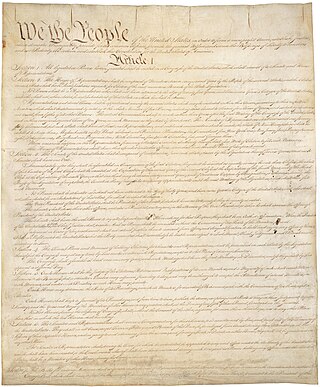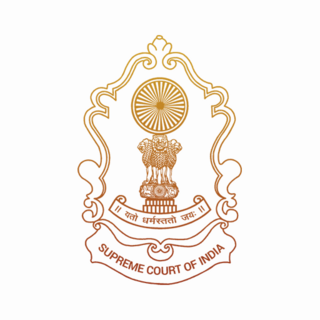The following is a list of the North Dakota Supreme Court justices, split into their respective courts.
The following is a list of the North Dakota Supreme Court justices, split into their respective courts.

Badminton is a racquet sport played using racquets to hit a shuttlecock across a net. Although it may be played with larger teams, the most common forms of the game are "singles" and "doubles". Badminton is often played as a casual outdoor activity in a yard or on a beach; formal games are played on a rectangular indoor court. Points are scored by striking the shuttlecock with the racquet and landing it within the other team's half of the court.

A barrister is a type of lawyer in common law jurisdictions. Barristers mostly specialise in courtroom advocacy and litigation. Their tasks include arguing cases in courts and tribunals, drafting legal pleadings, researching the law and giving legal opinions.

In law, common law is the body of law created by judges and similar quasi-judicial tribunals by virtue of being stated in written opinions.

The International Criminal Court is an intergovernmental organization and international tribunal seated in The Hague, Netherlands. It is the first and only permanent international court with jurisdiction to prosecute individuals for the international crimes of genocide, crimes against humanity, war crimes and the crime of aggression. The ICC is distinct from the International Court of Justice, an organ of the United Nations that hears disputes between states.

The International Court of Justice, or colloquially the World Court, is the only international court that adjudicates general disputes between nations, and gives advisory opinions on international legal issues. It is one of the six organs of the United Nations (UN), and is located in The Hague, Netherlands.

The Constitution of the United States is the supreme law of the United States. It superseded the Articles of Confederation, the nation's first constitution, on March 4, 1789. Originally including seven articles, the Constitution delineates the national frame and constrains the powers of the federal government. The Constitution's first three articles embody the doctrine of the separation of powers, in which the federal government is divided into three branches: the legislative, consisting of the bicameral Congress ; the executive, consisting of the president and subordinate officers ; and the judicial, consisting of the Supreme Court and other federal courts. Article IV, Article V, and Article VI embody concepts of federalism, describing the rights and responsibilities of state governments, the states in relationship to the federal government, and the shared process of constitutional amendment. Article VII establishes the procedure subsequently used by the 13 states to ratify it. The Constitution of the United States is the oldest and longest-standing written and codified national constitution in force in the world.

The First Amendment to the United States Constitution prevents the government from making laws respecting an establishment of religion; prohibiting the free exercise of religion; or abridging the freedom of speech, the freedom of the press, the freedom of assembly, or the right to petition the government for redress of grievances. It was adopted on December 15, 1791, as one of the ten amendments that constitute the Bill of Rights.

The Supreme Court of the United States (SCOTUS) is the highest court in the federal judiciary of the United States. It has ultimate appellate jurisdiction over all U.S. federal court cases, and over state court cases that turn on questions of U.S. constitutional or federal law. It also has original jurisdiction over a narrow range of cases, specifically "all Cases affecting Ambassadors, other public Ministers and Consuls, and those in which a State shall be Party." The court holds the power of judicial review: the ability to invalidate a statute for violating a provision of the Constitution. It is also able to strike down presidential directives for violating either the Constitution or statutory law.

Volleyball is a team sport in which two teams of six players are separated by a net. Each team tries to score points by grounding a ball on the other team's court under organized rules. It has been a part of the official program of the Summer Olympic Games since Tokyo 1964. Beach volleyball was introduced to the programme at the Atlanta 1996 Summer Olympics. The adapted version of volleyball at the Summer Paralympic Games is sitting volleyball.

Thoroughgood "Thurgood" Marshall was an American civil rights lawyer and jurist who served as an associate justice of the Supreme Court of the United States from 1967 until 1991. He was the Supreme Court's first African-American justice. Prior to his judicial service, he was an attorney who fought for civil rights, leading the NAACP Legal Defense and Educational Fund. Marshall was a prominent figure in the movement to end racial segregation in American public schools. He won 29 of the 32 civil rights cases he argued before the Supreme Court, culminating in the Court's landmark 1954 decision in Brown v. Board of Education, which rejected the separate but equal doctrine and held segregation in public education to be unconstitutional. President Lyndon B. Johnson appointed Marshall to the Supreme Court in 1967. A staunch liberal, he frequently dissented as the Court became increasingly conservative.
Brown v. Board of Education of Topeka, 347 U.S. 483 (1954), was a landmark decision of the U.S. Supreme Court ruling that U.S. state laws establishing racial segregation in public schools are unconstitutional, even if the segregated schools are otherwise equal in quality. The decision partially overruled the Court's 1896 decision, Plessy v. Ferguson, which held that racial segregation laws did not violate the U.S. Constitution as long as the facilities for each race were equal in quality, a doctrine that had come to be known as "separate but equal." The Court's unanimous decision in Brown and its related cases paved the way for integration, was a major victory of the civil rights movement, and a model for many future impact litigation cases.

The French Open, also known as Roland-Garros, is a major tennis tournament held over two weeks at the Stade Roland Garros in Paris, France, beginning in late May each year. The tournament and venue are named after the French aviator Roland Garros. The French Open is the premier clay court championship in the world and the only Grand Slam tournament currently held on this surface. It is chronologically the second of the four annual Grand Slam tournaments, occurring after the Australian Open and before Wimbledon and the US Open. Until 1975, the French Open was the only major tournament not played on grass. Between the seven rounds needed for a championship, the clay surface characteristics, and the best-of-five-set men's singles matches, the French Open is widely regarded as the most physically demanding tournament in tennis.

Joan Ruth Bader Ginsburg was an American lawyer and jurist who served as an associate justice of the Supreme Court of the United States from 1993 until her death in 2020. She was nominated by President Bill Clinton to replace retiring justice Byron White, and at the time was viewed as a moderate consensus-builder. Ginsburg was the first Jewish woman and the second woman to serve on the Court, after Sandra Day O'Connor. During her tenure, Ginsburg authored the majority opinions in cases such as United States v. Virginia (1996), Olmstead v. L.C. (1999), Friends of the Earth, Inc. v. Laidlaw Environmental Services, Inc. (2000), and City of Sherrill v. Oneida Indian Nation of New York (2005). Later in her tenure, Ginsburg received attention for passionate dissents that reflected liberal views of the law. She was popularly dubbed "the Notorious R.B.G.", a moniker she later embraced.

The federal government of the United States is the national government of the United States, a federal republic located primarily in North America, composed of 50 states, five major self-governing territories, several island possessions, and the federal district and national capital of Washington, D.C., where most of the federal government is based.

The Supreme Court of India is the supreme judicial authority and the highest court of the Republic of India. It is the final court of appeal for all civil and criminal cases in India. It also has the power of judicial review. The Supreme Court, which consists of the Chief Justice of India and a maximum of fellow 33 judges, has extensive powers in the form of original, appellate and advisory jurisdictions.

Territories of the United States are sub-national administrative divisions overseen by the federal government of the United States. The various American territories differ from the U.S. states and Indian reservations as they are not sovereign entities. In contrast, each state has a sovereignty separate from that of the federal government and each federally recognized Native American tribe possesses limited tribal sovereignty as a "dependent sovereign nation." Territories are classified by incorporation and whether they have an "organized" government through an organic act passed by the Congress. American territories are under American sovereignty and, consequently, may be treated as part of the United States proper in some ways and not others. Unincorporated territories in particular are not considered to be integral parts of the United States, and the Constitution of the United States applies only partially in those territories.

The Government of India (GoI), constitutionally known as the Union Government and also called the Central Government, is the national authority of the Republic of India, a federal republic located in South Asia, consisting of 28 states and eight union territories.

Samuel Anthony Alito Jr. is an American jurist who serves as an associate justice of the Supreme Court of the United States. He was nominated to the high court by President George W. Bush on October 31, 2005, and has served on it since January 31, 2006. After Antonin Scalia, Alito is the second Italian American justice to serve on the U.S. Supreme Court.

In the United States, a state is a constituent political entity, of which there are 50. Bound together in a political union, each state holds governmental jurisdiction over a separate and defined geographic territory where it shares its sovereignty with the federal government. Due to this shared sovereignty, Americans are citizens both of the federal republic and of the state in which they reside. State citizenship and residency are flexible, and no government approval is required to move between states, except for persons restricted by certain types of court orders.

Clarence Thomas is an American lawyer and jurist who serves as an associate justice of the Supreme Court of the United States. He was nominated by President George H. W. Bush to succeed Thurgood Marshall and has served since 1991. After Marshall, Thomas is the second African American to serve on the Supreme Court and has been its longest-serving member since Anthony Kennedy's retirement in 2018. Since Stephen Breyer's retirement in 2022, he is also the Court's oldest member.